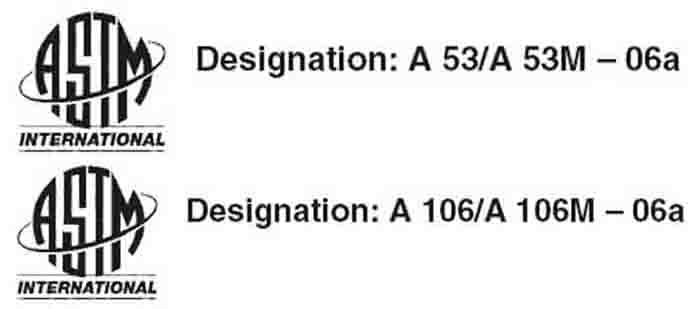A53 Pipe vs A106 Pipe – (1)Scope
ASTM A53 is Standard Specification for Pipe, Steel, Black and Hot-Dipped, Zinc-Coated, Welded and Seamless.
ASTM A106 is Standard Specification for Seamless Carbon Steel Pipe for High-Temperature Service.
A53 Pipe vs A106 Pipe – (2)Applied Type of Pipe
A 53 can be welded seam or seamless depending on how it is specificed for purchase. It is a general steel pipe spec and covers galvanized pipe as well as black pipe.
A106 is a similar pipe in chemical composition but is intened for high temperature service (up to 750 Degs F). It is a seamless pipe.
At least in the US, there is usually A53 for welded pipe while A106 is seamless. If you ask for A53 in the US they will quote A106 as an alternate.
A53 Pipe vs A106 Pipe – (3)Chemical Composition
For example when we compare between A106-B and A53-B seamless from chemical composition point of view, we find that :
1. A106-B contains silicon, min. 0.10% where A53-B has zero%, and silicon is the important element for improving the heat resistance criteria.
2. A106-B contains manganese 0.29-1.06%, where A53-B 1.2%.
3. A106-B contains low sulfur and phosphorus, max. 0.035% where A53-B contains 0.05 and 0.045% respectively.
A53 Pipe vs A106 Pipe – (4) Mechanical Properties
| Spec | Mechanical Properties | |||
| Grade A | Grade B | Grade C | ||
| ASTM A53 | Tenside strength, min, psi (MPa) | 48000(330) | 60000(415) | |
| Yield strength, min, psi (MPa) | 30000(205) | 35000(240) | ||
| ASTM A106 | Tenside strength, min, psi (MPa) | 48000(330) | 60000(415) | 70000(485) |
| Yield strength, min, psi (MPa) | 30000(205) | 35000(240) | 40000(275) | |
Other difference for A53 Pipe vs A106 Pipe
Because they have different scope and specify different type of pipe, then the manufacturing process and required quality control test and inspection will be different to each other. Leave a comment if you have specified opinion.

The statements above conflict with each other. In the scope, A53 is high temperature and in the applied type of pipe A106 is.
A53 Pipe vs A106 Pipe – (1)Scope
ASTM A53 is Standard Specification for Seamless Carbon Steel Pipe for High-Temperature Service.
ASTM A106 is Standard Specification for Pipe, Steel, Black and Hot-Dipped, Zinc-Coated, Welded and Seamless1
A53 Pipe vs A106 Pipe – (2)Applied Type of Pipe
A 53 can be welded seam or seamless depending on how it is specificed for purchase. It is a general steel pipe spec and covers galvanized pipe as well as black pipe.
A106 is a similar pipe in chemical composition but is intened for high temperature service (up to 750 Degs F). It is a seamless pipe.
At least in the US, there is usually A53 for welded pipe while A106 is seamless. If you ask for A53 in the US they will quote A106 as an alternate.
Hi, Theresa, our editor mistook it and corrected it for the scope.Thank you.
Hi
Please note your description for A53 and A106 unde’scope’ for the above website is incorrect. A106 is the seamless carbon steel for high temperature
Kind regards
Yes, you are right, Henri. Our editor mistook it. Thank you for your notice.
Scope explanations seems switched each other. A106B is the one for solely seamless.
Yes, Jihoon, you are right and ASTM A106 spec is only for seamless pipes. However, there are some customer who don’t know that. And I mention some buyer even write ASTM A53/A106 on welded pipes.
Glad your editor took the time to correct the mistake. Was an understandable mistake and I’m glad they took the time to apologize and correct. Thanks for the article.
What piping should we used for laying the underground natural gas line.
You should apply API 5L standard which is used for line pipe for petroleum and gas pipe.
A53 is ASTM equivalent of API5L correct
For some steel pipe applications, yes. For example, for ordinary pipe application. API 5L B is equivalent to ASTM A53 B. But for high pressure line pipes, like X60 or X65 grade in API 5L, then there is no equivalent grades in ASTM A53.
Can we weld ASTM A53 pipe with ASTM A105 fittings, If it is yes, please help me with which weld process it can be done.
Hi, Vilva, if steel grade is the same, yes, you could weld together. But for different steel grade pipe and fitting, it’s not recommended to weld.